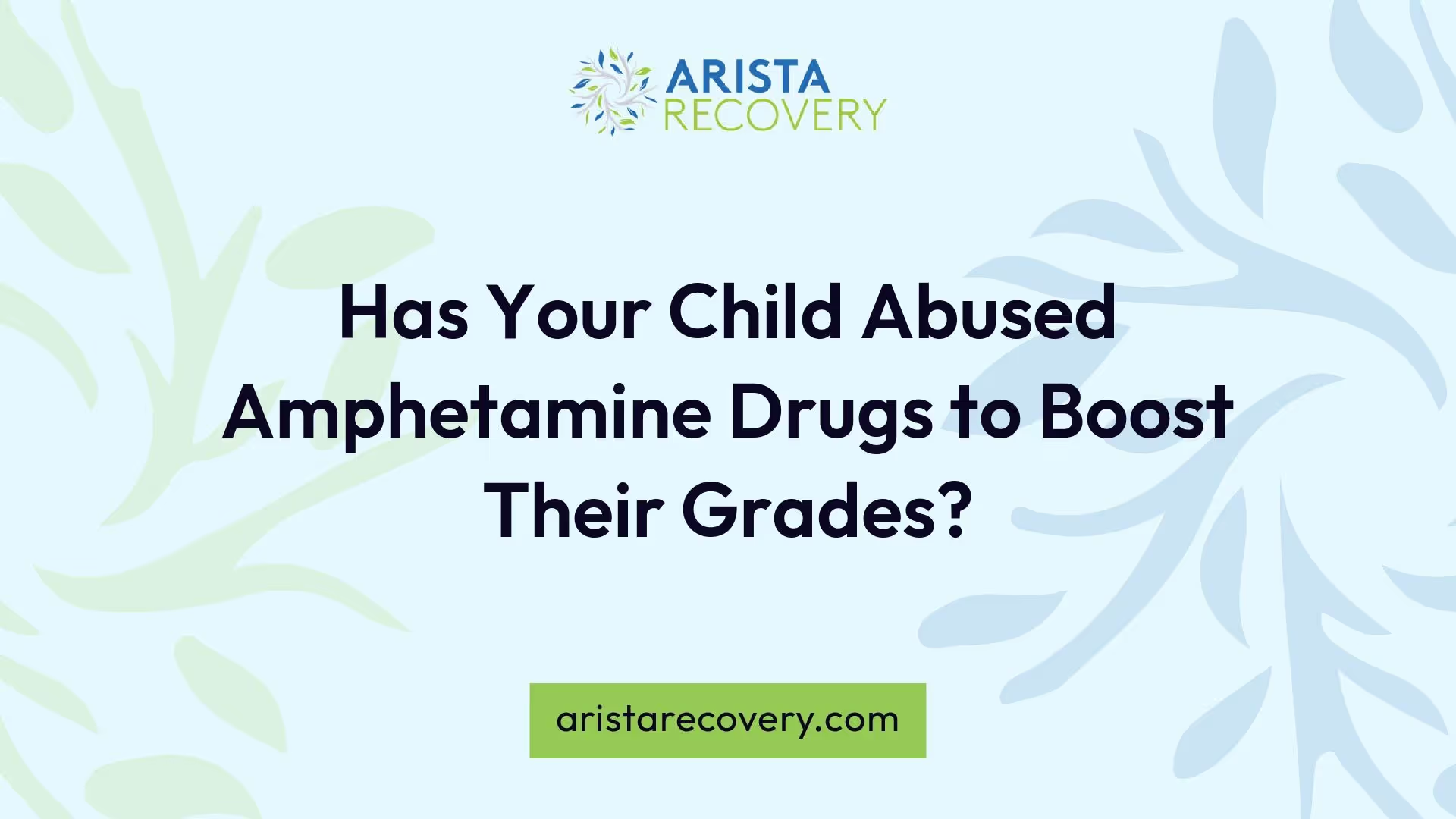
Has Your Child Abused Amphetamine Drugs to Boost Their Grades?
Understanding Substance Misuse
Overview of Substance Misuse
Substance misuse is a growing concern, particularly among youth looking for ways to enhance their academic performance. Children may resort to using drugs like amphetamines, which are often prescribed for conditions such as Attention Deficit Hyperactivity Disorder (ADHD). These drugs are known for their ability to increase focus and wakefulness, making them attractive to students who feel pressure to excel academically [1].

The misuse of prescription medications like amphetamines is alarming, leading to severe long-term effects. It's vital for parents, educators, and communities to be informed about these trends to better support children in making healthier choices.
Type of SubstanceCommonly MisusedPotential ConsequencesAmphetaminesAdderall, DexedrineHealth risks; legal issues; academic decline
Preventing amphetamine abuse is crucial for maintaining the well-being and success of children. Key strategies include education, awareness, and fostering a supportive environment that encourages open conversations about the dangers of drug misuse.
Impact on Academic Performance
While the immediate impact of using substances like amphetamines might seem beneficial, as it could lead to improved focus, the reality is often quite different. Children who abuse these substances might experience a decline in their overall academic performance in the long term due to dependency issues, physical health problems, and legal repercussions associated with drug misuse [1].
The consequences can be severe:
Students encountering these challenges may find it increasingly difficult to perform well academically, leading to a vicious cycle of substance reliance and further academic struggles.
By understanding the patterns of substance misuse among students, the community can take actionable steps to foster healthier educational environments. Establishing conversations about drug use, recognizing the signs of misuse, and supporting at-risk youth can lead to more positive academic outcomes. Resources like talk to kids about prescription drug abuse can provide guidance to parents on how to approach this essential topic.
Risks and Consequences
Dependency and Addiction
The misuse of amphetamines, particularly among children seeking to boost their academic performance, can lead to serious dependency and addiction issues. Extended use of these stimulants can create a reliance on the drug for academic success, leading to psychological and physical dependence. Dependency often results from changes in brain chemistry, as amphetamines increase the release of neurotransmitters such as dopamine and norepinephrine. Over time, individuals may find that they require higher doses to achieve the same effect, further escalating their dependence.
Statistics show the risk of addiction is significant, especially as young users may not fully comprehend the long-term consequences of their actions. In fact, long-term misuse can result in severe shortcomings such as:
IssueDescriptionInhibited GrowthPotential adverse effects on physical development in adolescents.AddictionA heightened risk of developing substance use disorders.Behavioral ChangesIncreased risk of mood swings, anxiety, and aggression.
Health Implications
Misusing amphetamines for academic advantage can also lead to numerous health complications. The consequences can manifest in both physical and mental health forms. Common health issues associated with the misuse of these substances include:
Health ComplicationDescriptionHeart DiseaseIncreased heart rate and blood pressure can lead to severe cardiovascular problems.SeizuresThe risk of seizures increases, particularly with high doses.Mental Health DisordersConditions such as anxiety, depression, and paranoia can arise [1].Infectious DiseasesHigher risk of contracting HIV and hepatitis from related risky behaviors, such as sharing needles [3].Severe Dental IssuesCommonly referred to as "meth mouth," where users suffer from severe tooth decay.
Due to the potential for addiction and severe health complications, amphetamines are regulated as Schedule II controlled substances in the United States. This classification reflects their high potential for abuse [4]. Addressing this issue promptly is critical, as early intervention can mitigate these risks. Encouraging conversations about the dangers of substance misuse can be an effective preventive measure, leading to healthier choices for young individuals. For more guidance on these discussions, refer to our article on talking to kids about prescription drug abuse.
Preventive Measures
Preventing amphetamine misuse is critical to safeguarding the health and academic performance of children. Effective strategies include education, awareness, setting boundaries, and fostering a supportive environment.
Education and Awareness
Raising awareness about the dangers of substance misuse is essential for both children and parents. Informational programs in schools and community centers can provide valuable insights into the risks associated with amphetamines. Education should focus on the potential consequences of abusing medications, including both physical health risks and potential academic setbacks.
Statistics show that individuals who abuse amphetamines are at a higher risk of severe health issues. For example, individuals misusing these drugs, particularly methamphetamine, are more susceptible to contracting infections such as HIV and hepatitis [3]. By educating children about these risks, they may be more inclined to avoid substance misuse.
Additionally, parents can take the initiative to create open lines of communication regarding drug use. They should encourage their children to discuss any pressures they may feel about academic performance and the potential lure of substances, including why some might think that children abused amphetamines to boost their grades.
Setting Boundaries
Establishing clear boundaries and expectations can significantly reduce the risk of amphetamine abuse among children. Parents and guardians should discuss and create family rules concerning drug use, emphasizing that the misuse of prescription medications is not tolerated.
Boundaries should also extend to academic pressure. Encouraging a balanced lifestyle, where academic success does not come at the expense of mental and physical wellbeing, is crucial. Creating a stress-free environment where children are praised for effort rather than solely for outcomes allows them to feel secure and supported in their academic endeavors.
To effectively handle potential situations where a child may be misusing substances, parents should be prepared to seek professional help early on. Addressing the issue promptly prevents further damage to the trust in the parent-child relationship and aids in establishing a clear plan towards recovery. Implementing these preventive measures can help protect children from the pitfalls associated with amphetamine misuse and foster healthier academic environments.
For further insights on addressing addiction, visit our article on talking to kids about prescription drug abuse.
Specific Drug Effects
Examining the effects of amphetamines and their commonly prescribed variant, Adderall, is essential to understanding the serious implications of misuse, especially when a child abused amphetamine to boost their grades.
Amphetamines vs. Adderall
Amphetamines are stimulant medications that enhance communication between the brain and body, leading to improved alertness and increased physical activity. While legitimate prescriptions for amphetamines are often granted for conditions such as ADHD and narcolepsy, some individuals misuse these substances to enhance study efforts or athletic performance.
Adderall is a brand name for a medication that combines amphetamine salts and is prescribed for ADHD. It activates the brain's reward center by increasing levels of norepinephrine and dopamine, which can create feelings of pleasure and happiness. However, the misuse of Adderall is particularly concerning, as it shares similar properties to amphetamines, which can lead to addiction and the inability to control usage [5].
CharacteristicAmphetaminesAdderallPrimary UseADHD, narcolepsyADHDMechanismIncreases neurotransmitter releaseBoosts norepinephrine and dopamine levelsRisksDependency, weight loss, growth inhibitionHeart issues, circulation problems, addiction
Misuse Signs and Risks
Recognizing the signs of misuse is crucial for early intervention and prevention. Individuals abusing amphetamines, particularly methamphetamine, face increased health risks, including contracting HIV and hepatitis due to behaviors like needle sharing [3]. The potential for addiction is significant with both amphetamines and Adderall.
Common signs of misuse may include:
For anyone concerned about a child's potential substance abuse, it is vital to approach the situation with care and seek help from professionals equipped to deal with addiction. It is also critical to educate young people on the dangers of drug misuse, as outlined in resources like talk to kids about prescription drug abuse.
In conclusion, the misuse of amphetamines and related medications such as Adderall poses serious health and behavioral risks, emphasizing the importance of awareness and preventive measures.
Treatment and Recovery
The journey towards recovery from substance misuse, especially in cases where children have abused amphetamines to boost their grades, involves comprehensive treatment strategies. These strategies are tailored to address both withdrawal symptoms and the need for professional assistance.
Withdrawal Symptoms
When an individual becomes dependent on amphetamines, they may experience a range of withdrawal symptoms upon reduction or cessation of the drug. These symptoms can impact daily functioning and mental health. Common withdrawal symptoms include:
Withdrawal SymptomDescriptionTrouble SleepingDifficulty falling or staying asleep, often leading to increased fatigue.Extreme TirednessA persistent feeling of overwhelming fatigue and lack of energy.DepressionFeelings of sadness, hopelessness, or irritability that can affect mood.
Individuals misusing medications like Adderall may find that they develop a tolerance over time, leading to greater usage to achieve the same effects. Stopping or reducing intake without proper support can result in these severe withdrawal symptoms [5].
Professional Help
Seeking professional assistance is a critical step in the recovery process for those who have misused substances. Treatment programs often include counseling, behavior change techniques, and family support to help individuals navigate their challenges. These programs can vary in intensity and may include:
Recognizing signs of addiction is essential. For example, individuals may struggle with controlling the urge to take the drug, spend excessive time obtaining and using it, or persist in use despite adverse consequences [5]. Family involvement and community support play critical roles in facilitating recovery and preventing relapse.
Recovering from addiction is a multi-faceted journey. To learn about how to address addiction in family settings, consider our article on don’t keep child addiction a secret or discover ways to talk to kids about prescription drug abuse.
Research and Medical Use
Clinical Trials Overview
Amphetamines are widely studied in clinical settings, particularly for their application in treating pediatric conditions like attention deficit hyperactivity disorder (ADHD). Recent data from a study on ClinicalTrials.gov, as of August 6, 2023, shows that 179 clinical trials related to amphetamines were identified, with 19 trials focusing specifically on ADHD. In fact, ADHD was the predominant condition under investigation, appearing in 84.2% of the studies.
The trials yielded relevant statistics concerning their design and focus:
Study CharacteristicsPercentage (%)Phase 4 Trials36.8Randomized Allocation63.2Parallel Intervention Model42.1Participants from the US78.9
These characteristics reflect rigorous methodologies to assess the effects of amphetamines on young patients. Amphetamines, including popular medications like Adderall and dextroamphetamine, are specifically aimed at improving symptoms associated with ADHD and other related conditions.
Pediatric Medicine Applications
Amphetamines are not just limited to ADHD treatment; they hold promise for treating other pediatric conditions as well. Research indicates that amphetamines could be beneficial for children who have experienced traumatic brain injuries. Their potential ability to enhance synaptic transmission and promote neural plasticity may accelerate recovery and improve cognitive functions. However, further investigation is necessary to confirm these benefits and assess any associated risks [4].
Despite the therapeutic advantages, concerns regarding misuse, dependency, and the impact of these drugs on the developing brain are significant. The structural and functional changes that can occur in the brain due to long-term amphetamine usage underline the need for ongoing research to better understand the implications of such treatments in children. Awareness and education surrounding child abused amphetamine to boost their grades is crucial for fostering a safer environment for youth. Appropriate measures and guidelines should be established to ensure that the benefits of medication do not compromise the health of young patients.
For additional guidance on how to talk to children about prescription drug abuse, you can visit our article on talk to kids about prescription drug abuse.
When mental health challenges and addiction intersect, it can feel isolating. At Arista, we offer compassionate, evidence-based, and trauma-informed care to help you heal, grow, and move forward.
You’re not alone in this.
When mental health challenges and addiction intersect, it can feel isolating. At Arista, we offer compassionate, evidence-based, and trauma-informed care to help you heal, grow, and move forward.
Support that moves with you.
You’ve taken a brave first step. At Arista Recovery, we’re here to help you continue with best-in-class care designed for long-term healing and support.
.webp)






